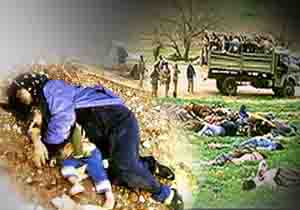Jim Lobe and I wrote a report yesterday for IPS News about the expected US decision to delist the Mujahedeen-e-Khalq (aka MEK, PMOI and NCRI) from its foreign terrorist organizations (FTO)  list. Most analysts we interviewed predicted that the removal would only worsen already abysmal relations with Iran and possibly make any effort to defuse the gathering crisis over its nuclear programme yet more difficult. Here’s a round-up of what they had to say beginning with statements that came in following the article’s publication:
list. Most analysts we interviewed predicted that the removal would only worsen already abysmal relations with Iran and possibly make any effort to defuse the gathering crisis over its nuclear programme yet more difficult. Here’s a round-up of what they had to say beginning with statements that came in following the article’s publication:
John Limbert, a retired career Foreign Service officer and former embassy hostage in Tehran who served as the first-ever Deputy Assistant Secretary of State for Iran from 2009 to 2010 when he returned to teach at the US Naval Academy:
There may be reasons, but it’s a strange and disappointing decision.
I know the group claims it has abandon its violent and anti-American past. I wish I could believe them. They have a very dubious history and a similarly dubious present.
Farideh Farhi, Iran expert at the University of Hawaii:
As to the MEK delisting, especially after high-level leaks by members of the US intelligence community that the MEK was involved in terror operations inside Iran, the decision will no doubt make the Iranian leadership even more distrustful of US intentions regarding the future of Iran, particularly given the congressional support for the MEK to spearhead regime change. Less trust will make compromise less likely, presumably a preferred outcome for the high profile supporters of the MEK in Congress and elsewhere.
Note that the Obama Administration’s humanitarian argument for delisting says very little about the future operation of this group in the US and how their well-funded operation and agitation for regime change will be promoted or managed in the US. This ambiguity by itself will be a source of tension and will be used by hardliners inside Iran to further delegitimize all efforts to agitate for political reform from inside and outside of the country.
The issue is not about whether something needed to be done to help the poor souls caught in Iraq, abused by everyone including their own cult-like organization. The issue has to do with the wisdom of linking the highly political and politicized process of de-listing to a humanitarian effort.
Paul Pillar, a former top CIA analyst who served as the National Intelligence Officer for the Near East and South Asia from 2000 to 2005:
“Delisting will be seen not only by the Iranian regime, but also by most Iranian citizens, as a hostile act by the United States.”
“The MEK has almost no popular support within Iran, where it is despised as a group of traitors, especially given its history of joining forces with Saddam Hussein during the Iran-Iraq War,” Pillar, who now teaches at George Washington University, added.
“Any effect of the delisting on nuclear negotiations will be negative; Tehran will read it as one more indication that the United States is interested only in hostility and pressure toward the Islamic Republic, rather than coming to terms with it.”
Seyed Hossein Mousavian, a former senior Iranian diplomat and nuclear negotiator currently at Princeton University:
“The Iranian security establishment’s assessment has long believed that foreign intelligence agencies, specifically the CIA, Israeli Mossad, and the UK’s MI6 utilise the MEK for terror attacks on Iranian nuclear scientists, nuclear sabotage and intelligence gathering,”…
“Therefore, the delisting of MEK will be seen in Tehran as a reward for the group’s terrorist actions in the country,” he wrote in an email exchange with IPS. “Furthermore, Iran has firmly concluded that the Western demands for broader inspections (of Iran’s nuclear programme), including its military sites, are a smokescreen for mounting increased cyber attacks, sabotage and terror of nuclear scientists.
“Delisting MEK would be considered in Tehran as a U.S.-led effort to increase sabotage and covert actions through MEK leading inevitably to less cooperation by Iran with the IAEA (the International Atomic Energy Agency).”
He added that government in Tehran will use this as a way of “demonstrating to the public that the U.S. is seeking …to bring a MEK-style group to power” which, in turn, “would strengthen the Iranian nation’s support for the current system as the perceived alternative advanced by Washington would be catastrophic.”
Karim Sadjadpour, analyst at the Carnegie Endowment for International Peace:
…said the move was unlikely to be “game-changer” in that “the MEK will continue to be perceived inside Iran as an antiquated cult which sided with Saddam Hussein during the (Iran-Iraq) war, and U.S. Iran relations will remain hostile.”
“It doesn’t help (Washington’s) image within Iran, certainly, and some Iranian democracy activists may misperceive this as a U.S. show of support for the MEK, which could have negative ramifications,” he noted.
Jamal Abdi, policy director at the National Iranian American Council:
“The biggest winner today is the Iranian regime, which has claimed for a long time that the U.S. is out to destroy Iran and is the enemy of the Iranian people,” said NIAC’s policy director, Jamal Abdi.
“It will certainly not improve U.S.-Iranian relations,” according to Alireza Nader, an Iran specialist at the Rand Corporation, who agreed that the “delisting reinforces Tehran’s longstanding narrative regarding U.S. hostility toward the regime.
“Nevertheless,” he added, “I don’t think it is detrimental to U.S. interests as Tehran suspects U.S. collusion with the MED anyhow, whether this perception is correct or not.”
Mila Johns, a researcher at the National Consortium for the Study of Terrorism and Responses to Terrorism at the University of Maryland:
“The entire atmosphere around the MEK’s campaign to be removed from the FTO list – the fact that (former) American government officials were allowed to actively and openly receive financial incentives to speak in support of an organisation that was legally designated as a Foreign Terrorist Organization, without consequence – created the impression that the list is essentially a meaningless political tool,” she told IPS.
“It is hard to imagine that the FTO designation holds much legitimacy within the international community when it is barely respected by our own government,” she said.
No other group, she noted, has been de-listed in this way, “though now that the precedent has been set, I would expect that other groups will explore this as an option.”
By Jasmin Ramsey


